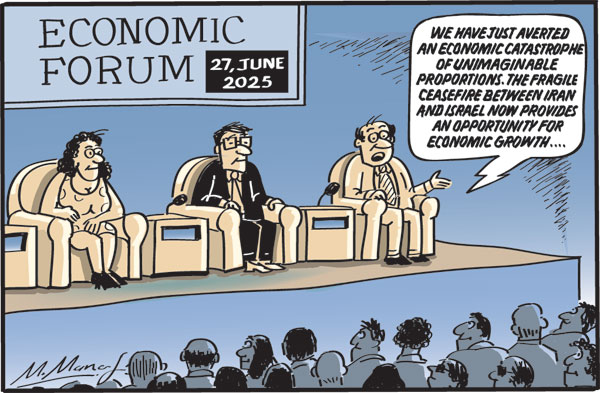Columns
Ceasefire in West Asia would stabilise economy and prevent hardships
View(s):The fragile and uncertain ceasefire in the Israel-Iran war provides much relief to the country’s economy. Had the war escalated, our trade, inward remittance and tourism-dependent economy would have been devastated.
Catastrophe averted
We have just averted an economic catastrophe and calamity of huge proportions. Had the Israel-Iran war escalated, it would have wiped out our economic gains, depleted our external finances and threatened our food security.
The cessation of hostilities and a durable peace could consolidate our economic gains. Had the Israel-Iran war escalated, it would have severely affected us, especially if Iran had blocked the vital Strait of Hormuz, through which 20 per cent of the world’s oil supplies pass.
Unpredictable
If that had happened, our imports of crude oil, fertiliser and food, together with tea and other exports to West Asia, would have been crippled. The country’s food security would have been threatened as never before.

Reversal
The week that began with Sri Lanka facing severe threats to its economy ended with hopes of economic gains, following the announcement of the ceasefire. The continuity of the ceasefire is imperative for our economy to sustain its growth momentum.
However, current international developments are highly chaotic. This is particularly due to the uncertain and unpredictable actions of United States President Donald Trump.
Bitter enemies
Furthermore, Israel and Iran are intent on destroying each other. We can only hope that there will be peace in West Asia. The international community must ensure peace in West Asia not only by compelling both Iran and Israel to stick to the ceasefire but also by working out a two-state solution to the Palestinian question.
Past week
The week that was has changed global conditions drastically. It could have affected the Sri Lankan economy drastically in many ways. On the one hand, the absence of peaceful conditions—prolonged conflicts, wars and tensions—could have destabilised our trade, tourism and global economic stability and brought about a global recession.
On the other hand, it is difficult to envisage the post-conflict economic conditions. Whatever these are, in the coming months, the adverse impacts on the Sri Lankan economy, as discussed in last Sunday’s column, are likely to prevail.
Economic gains
The deceleration in inflation, the prospect of a 5 per cent growth this year and the further buildup of the current foreign reserves are some of the gains Sri Lanka has made in recent months, but the gains are vulnerable to external factors. These gains that the IMF described as remarkable achievements are likely to be undermined if the ceasefire is observed in the breach.
In such an event, the increase in import costs, reduced export earnings, lower inward remittances and earnings from tourism would erode our external reserves and weaken our balance of payments.
Speculation
Already speculation of the imminent difficulties has made fertiliser stocks go underground and be unavailable to farmers. The government has said there are adequate stocks of fertiliser in the country to no avail. New shipments of fertiliser would, of course, be at much higher costs if the ceasefire is violated by either party.
Rice and petrol
If there is no peace in West Asia, the unavailability of fertiliser would reduce paddy output in Yala, escalate prices and threaten the nation’s food security as food import costs are likely to rise sharply. Government intervention to control rice prices could further aggravate the crisis.
Similarly, a shortage of petrol is likely when people begin to fill their tanks and hoard petrol to avoid higher prices.
Concluding reflection
Global economic conditions are in a state of immense uncertainty. At the time of writing on Thursday, a ceasefire is in place, but there are doubts about its sustainability. As far as Sri Lanka is concerned, the containment of the conflict has prevented an economic disaster.
Had the Iranians blocked the Hormuz Strait, our supplies of crude oil, fertiliser and food would have skyrocketed, and our exports of tea to West Asia would have been crippled. Whether another escalation of the war would lead to a blockade of the Hormuz straits is a serious concern.
If the fragile ceasefire continues, Sri Lanka’s economy could continue to grow and the external finances could improve. If it does not, the current gains in tourism and inward remittances are likely to drop and create a dent in our balance of payments and strain our foreign reserves.
We must work out strategies to cope with the worst possible scenario.
Buying or selling electronics has never been easier with the help of Hitad.lk! We, at Hitad.lk, hear your needs and endeavour to provide you with the perfect listings of electronics; because we have listings for nearly anything! Search for your favourite electronic items for sale on Hitad.lk today!


Leave a Reply
Post Comment